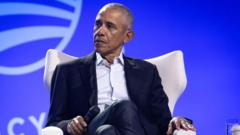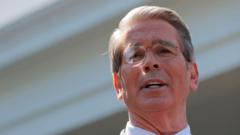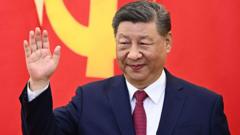Following the announcement of steep tariffs, President Trump has decided to pause them for 90 days, leading to a market surge and renewed discussions over international trade dynamics.
Trump’s Tariff Tango: A 90-Day Pause and Its Implications

Trump’s Tariff Tango: A 90-Day Pause and Its Implications
President Trump's recent decision to pause tariffs for 90 days has triggered a significant market response and implications for U.S. trading relations.
In a surprising turn of events, President Trump has announced a temporary 90-day pause on the steep tariffs that he previously imposed on various U.S. trading partners. This announcement came shortly after the market reacted negatively to his initial decision, causing significant turmoil, especially in bond markets. The S&P 500 experienced a noteworthy rebound, surging by 9.5% and marking its most substantial daily gain since 2008.
Although Trump’s administration initially justified the tariffs as a tool for achieving better trade agreements, insiders suggest that the swift policy shift was largely a reaction to the unforeseen negative market consequences. The president had invoked tariffs not seen in a century, raising fears among economists regarding potential recession.
Under the new pause, nearly all trading partners will face a general tariff of 10%, accompanied by a particularly steep 125% tariff on China, in response to its retaliatory actions. This situation presents a complex chess game where neither the U.S. nor its trading partners can afford to appear weak, as they attempt to negotiate their way through an increasingly fraught economic landscape.
Market analysts and advisors have noted that Trump's obsession with tariffs might be overshadowed by a deep desire to negotiate deals favoring the U.S. For instance, Steven Erlanger commented on the confusion surrounding Trump’s objectives, highlighting a dual narrative where the president aims to reshape global trading while simultaneously seeking favorable trade relations.
The pause has energised markets, particularly in Asia, where countries exempted from the tariffs experienced significant gains. In response to Trump’s tariff uncertainties, Canada has pledged to utilize expected revenue from retaliatory tariffs to support its domestic businesses. Concurrently, British and European leaders are observing the developments closely, with comparisons being made between Trump’s administration and the recent political journeys of Liz Truss.
As discussions around tariffs continue, businesses brace for the potential long-term ramifications of Trump’s trade strategy, while other nations, such as the Philippines, look for business opportunities amid the chaos. Meanwhile, China seems to be managing domestic discourse about these tariffs, potentially to maintain social stability and avoid public dissent.
In conclusion, while Trump's decision to temporarily pause tariffs alleviates some immediate market fears, the underlying tension in U.S. trade relations remains and is likely to shape international economic dynamics in the months to come.





















